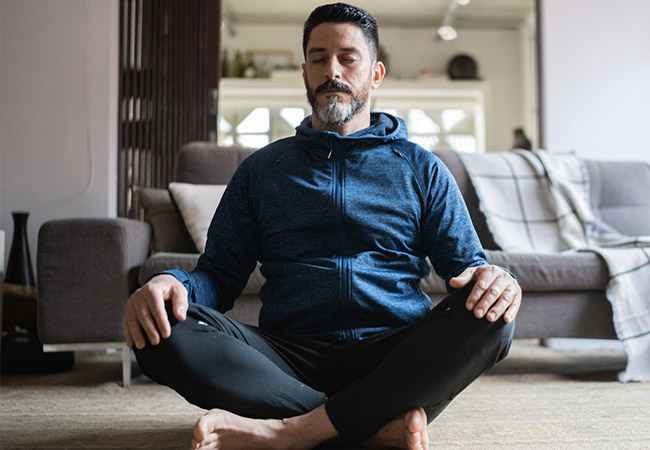Meditation is widely known as an effective way to clear your mind and reduce stress in your everyday life. Now, research shows that mindfulness meditation can work just as well as daily medication for people suffering from anxiety — all without the risk of drug-related side effects.
In the US, anxiety disorders will affect 40% of women and more than 25% of men at some point in their lifetime. With this risk in mind, many people may want to start a daily meditation practice but aren’t sure how to do it. The good news is that there's no "right" or "wrong" way to meditate. It can be hard to find the motivation to practice meditation if you are new to it, but there’s a good chance sticking with it will be worth your effort. Read on to learn more about the many benefits of meditation, along with tips and techniques to get you started.
The medication vs. meditation study
A recent study found that daily mindfulness meditation was just as effective at curbing anxiety as a common selective serotonin reuptake inhibitor (SSRI) drug — in this case, Lexapro. It revealed that people who meditated got the same results as those who took Lexapro daily: Both groups reported a 30% decline in their anxiety levels after eight weeks. However, 80% of those taking the medication also reported side effects like insomnia, nausea, and headaches.
This study is notable because it’s one of the first to compare meditation with medication, and it adds to the growing library of research demonstrating the many mental health benefits of mindfulness meditation in particular.
What is mindfulness meditation?
Mindfulness meditation is a mental training practice that teaches you to slow down racing thoughts, let go of negativity, and calm your mind and body. It combines meditation with the practice of mindfulness, which involves fully focusing on the “now” so you can acknowledge and accept your thoughts, feelings, and sensations without judgment.
Practicing mindfulness meditation involves deep breathing and awareness of body and mind. You don’t need any props or preparation — just a quiet place to sit, five minutes of free time, and a judgment-free mindset.
Why meditate?
Research consistently shows that meditation can:
- Boost your mood
- Reduce anxiety, depression, and stress
- Improve concentration and memory
- Help you regulate emotions
- Reduce pain and fatigue from chronic health conditions
Tips for getting started
Here are some steps to help you practice mindfulness meditation.
- Get comfortable. Find a comfortable, quiet place where you won’t be disturbed. Sit in a chair or on the floor with your head, neck, and back straight but not stiff.
- Set a timer. Setting a timer (preferably with a soft, gentle alarm) lets you forget about time so you can stay focused on meditating. Try starting with five-minute sessions and increasing the duration until you’re comfortable meditating for 30 minutes at a time.
- Focus on breathing. Become aware of the sensation of air moving in and out of your body as you breathe. Feel your belly rise and fall as the air enters your nostrils and leaves your nostrils. Pay attention to the temperature change when breath is inhaled versus exhaled.
- Notice your thoughts. When (not if) your mind wanders, don’t ignore or suppress your thoughts — just acknowledge them, remain calm, and bring your focus back to your breathing. Repeat this as often as needed. The goal is to let your thoughts pass without dwelling on them, as if watching a river flow.
- Be kind to yourself. Don't get discouraged if you keep getting carried away with your thoughts — this is normal and over time it will get easier. Remember, the practice of returning to your breath and refocusing on the present is the practice of mindfulness.
If you find meditating too difficult on your own, there are plenty of guided options out there, including Headspace and Calm, that can make it easier to get started and stay focused.
Please seek professional help if your anxiety becomes debilitating enough that it affects your daily life and relationships or if you have thoughts of hurting yourself or others. For immediate, confidential support, call or text the national mental health crisis lifeline number, 988, to be connected with a mental health counselor at any time.
Sources:
Study shows meditation can reduce anxiety just as well as medication: What you need to know,USA Today (usatoday.com), December 7, 2022


